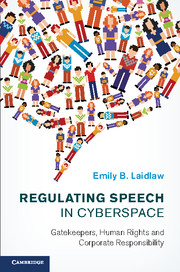Book contents
- Half title page
- Title page
- Copyright page
- Dedication
- Contents
- Preface
- Book part
- Glossary
- Table of legislation and cases
- 1 The internet as a democratising force
- 2 A framework for identifying internet information gatekeepers
- 3 Corporate social responsibility in cyberspace
- 4 Mechanisms of information control: ISPs
- 5 Mechanisms of information control: search engines
- 6 A corporate governance model for the Digital Age
- Concluding remarks
- Bibliography
- Index
- References
Bibliography
Published online by Cambridge University Press: 05 August 2015
- Half title page
- Title page
- Copyright page
- Dedication
- Contents
- Preface
- Book part
- Glossary
- Table of legislation and cases
- 1 The internet as a democratising force
- 2 A framework for identifying internet information gatekeepers
- 3 Corporate social responsibility in cyberspace
- 4 Mechanisms of information control: ISPs
- 5 Mechanisms of information control: search engines
- 6 A corporate governance model for the Digital Age
- Concluding remarks
- Bibliography
- Index
- References
- Type
- Chapter
- Information
- Regulating Speech in CyberspaceGatekeepers, Human Rights and Corporate Responsibility, pp. 287 - 315Publisher: Cambridge University PressPrint publication year: 2015



